Updated: 20 March 2025.
Getting pay or payroll wrong is a major risk for any business. Errors can be costly not only in terms of money and time, they could land you in seriously hot water, legally.
In Australia, business owners and management are ultimately responsible for any pay mistakes and their consequences. At worst, you could face hefty fines from a Fair Work Ombusman Inspector, or the Australian Taxation Office (ATO), as well as any interest and potential legal fees.
There is also the damage mishandling an employee’s pay can do to their trust and confidence in the business, which can end up harming your reputation and sapping morale across the company.
Unfortunately, pay errors aren't uncommon. People make mistakes, forget to do things, are unaware of their legal obligations, or confused by legislation and the different terms, conditions, and entitlements under modern awards and registered agreements.
In 2019, KPMG estimated that more than a million Australian workers (13% of the total workforce) were affected annually by underpayment of salary or wages, at a cost of more than $1.35 billion.
The combination of a good payroll system and strong HR system will help reduce mishaps and non-compliance with the law, and will make it quicker to identify and resolve any issues.
Let's look at some common pay mistakes that any business should watch out for.
Underpayment
Employers are responsible for ensuring their employees receive all entitlements when they're paid for work they do, but it isn't always simple to calculate those entitlements.
Scan the news headlines over the past few years and you’ll see how complex and confusing payment for base salary, overtime, penalties, allowances, and superannuation can be. Employers can easily make mistakes and you may not even know your business is doing it.
The slew of high-profile cases of Australian businesses getting pay wrong have led the federal government to change the Fair Work Act, making deliberate underpayment of employees - commonly called “wage theft” - illegal from 1 January 2025.
There are already fines under the Fair Work Act for the deliberate underpayment of wages. For example, in 2019, the Federal Circuit Court ordered fruit & vegetable seller, A & S Wholesale Fruit and Vegetables Pty Ltd, to pay $200,000 in penalties for underpaying workers. The company's director and operations manager were both given hefty fines on top of that.
Remember, your payroll system will only do what it has been told to do, so don’t just accept the numbers are correct and meet current legislation and awards. Review what payments are being included and excluded, and the number of hours employees work, to make sure the amounts are right.
Learn more about the importance of accurate leave management.
Overpayment
Overpaying your workers can be just as costly and harmful to your business as underpaying.
In 2020, the Australian Payroll Association revealed that 27 of 39 audits on clients' payroll processes in the previous 18 months had uncovered overpayments, with some errors estimated to cost employers millions of dollars.
Qantas Airways was a high profile company in the news for underpaying 55 staff an average of $8,000 over a period of years. At the same time, Qantas revealed it had overpaid another group of 165 workers around $12,000 each per year.
Overpayments can be hard on employees if they were unaware of the issue and are not in a financial position to repay the money. In certain circumstances, you might also find you are not able to recover the money and the employee (or ex-employee) keeps it.
Minimum wage compliance
Employees must be paid at least the minimum wage for every hour they work.
The national minimum wage is the lowest that a worker can be paid (as of 1 July 2025, the rate for full- or part-time employees is $24.95 per hour or $948 per week - before tax).
Most employees in Australia are employed in accordance with an award that covers their industry or occupation, and the minimum rate in awards are higher than the national minimum rate provided by the Fair Work Act 2009.
You and your employees can agree to any wage rate higher than the minimum rate that applies to them.
Superannuation payments must be paid in addition to the minimum wage.
If a business makes a serious failure to pay the minimum wage, it and its managers could face significant penalties.
The Fair Work Commission reviews the minimum wage each year, so you need to make sure you’re up-to-date with the latest rates.
Unlawful deductions
This is where things can get shady. Legally, you can't deduct money from your employee's wages unless it's for a lawful purpose (e.g. PAYG, child support payments, or student loan repayments), is reasonable, and the employee has agreed to the deduction in writing (they can withdraw their consent at any time).
Despite the clarity of the law, a surprising number of businesses incorrectly make deductions from their workers' pay. Sure, some may not know the full extent of their legal obligations, but there are some that just plainly flout the law, paying employees less hours than they actually work, or docking pay for damage to company property, and in other cases, taking money as reimbursement for visa applications and rent.
The law makes no distinction between an employer not knowing what deductions are legal and deliberately breaching the Fair Work Act, and employees can take cases of unlawful deductions to the Fair Work Commission. The Fair Work Ombudsman is also actively encouraging employees to tell them of breaches in employment law and they will prosecute businesses.
The bottom line is any deductions must be lawful and you should always discuss them first with your team members. If you are unsure, get legal advice before you proceed.
Payslips and record-keeping
Some employers make the mistake of thinking that paying their employees is all that matters, but there are various documentation and record-keeping obligations under the Fair Work Act and Fair Work Regulations.
For starters, every employee must receive a payslip, either in electronic form or hard copy, within 1 working day of being paid, even if they are on leave. The payslip must contain details of the payments, deductions, and superannuation contributions for each pay period.
Employers also have to keep time and wages records for 7 years and ensure they are readily accessible to a Fair Work Inspector. The range of information you need to document and store for each employee is quite broad, such as their:
- Pay records, including any loadings, penalty rates, or allowance.
- Hours of work records, including the number of overtime hours that an employee has worked each day or when the employee started and finished working overtime.
- Leave records, including leave taken, leave balances.
- Superannuation contributions, including amounts, dates, periods over which contributions were made.
- Termination records, including how the employee was terminated, notice, and the name of the person who terminated the employment
Failure to keep or have accurate records could land you a fine from Fair Work Inspectors. The Fair Work Ombudsman also takes employers to court for not keeping records or making them available for inspection.
Take pay seriously
The process of calculating pay and paying people can be complicated and extensive, but having sub-par payroll practices can be costly, ineffective, and a major risk for your business.
Whoever is in charge of payroll is critical to your company; they are performing more than simple data entry, and should be treated and paid accordingly.
Legislation and modern awards change frequently, so you need to ensure your system is up-to-date with things like classifications, pay rates, leave loading, and allowances.
Having a robust payroll system can help with accuracy, automation, and record-keeping. If you use payroll software, make sure it is designed and configured for the Australian business environment.
Coupling your payroll processes with the oversight of a good HR team will ensure you're always meeting all your legal requirements.
Read our article on the advantages of integrated payroll and HR systems.
-1.jpg)

.jpg)


